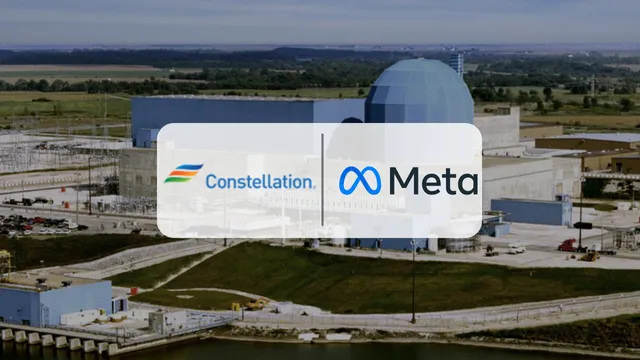CLINTON, IL — Facebook and Instagram’s parent company, Meta, has signed a 20-year agreement to purchase electricity from Constellation Energy’s Clinton nuclear power plant in central Illinois — a major move aimed at powering the company’s rapidly growing artificial intelligence operations.
A Long-Term Energy Commitment
Meta announced that it will begin sourcing nuclear-generated electricity from the Clinton plant beginning in 2027, using the energy to power its U.S. data operations. While the Clinton plant is the smallest of Illinois’ six nuclear sites, all of which are owned by Constellation, the deal reflects a strategic shift as tech companies increasingly seek stable, carbon-free energy sources to fuel massive AI workloads.
“This agreement ensures a critical plant will stay online and meet growing energy needs,” Meta said in a statement, “and allows Constellation to explore further nuclear development at the site.”
The Clinton facility, which has a single reactor, was previously subsidized by Illinois in 2016 after Exelon — then its owner — threatened to shut it down due to financial challenges. Customers have since been paying surcharges on their electric bills to help keep the plant operational.
Industry-Wide AI Energy Demands
Meta’s deal follows a similar move by Microsoft, which recently signed a power agreement tied to the Three Mile Island nuclear plant in Pennsylvania. That site, also owned by Constellation, had shut down in 2019 but is now being revived to meet the explosive power demands of the AI boom.
Joe Dominguez, CEO of Constellation, noted that “supporting the relicensing and expansion of existing plants is just as impactful as finding new sources of energy.”
Though Meta operates a data center in DeKalb, Illinois, the company hasn’t announced any expansion plans locally. Most of the nuclear-generated electricity will likely support its California-based infrastructure.
Illinois Faces Larger Energy Challenges
The announcement comes at a time when Illinois lawmakers recently failed to pass legislation aimed at addressing surging power demand statewide. That bill would have expanded access to solar and wind power and battery storage, while also ending a decades-long ban on building new nuclear power plants.
Due to the lack of legislative action, ComEd customers are expected to see higher electric bills next month — a reflection of increased national energy needs driven largely by tech-sector growth.
The legislation was blocked primarily by business interest groups, who raised concerns over potential costs. However, lawmakers have signaled they may revisit the issue during a special session in the fall.
Context on Constellation and Exelon
Exelon, the parent company of ComEd, spun off its nuclear energy business three years ago, forming Constellation as a standalone nuclear operator. Constellation now owns all six nuclear power plants in Illinois, including the Clinton site.
With this agreement, Meta is taking a significant step in its goal to power AI and data centers with reliable and sustainable energy sources — even as Illinois grapples with how to expand and modernize its energy infrastructure to meet future needs.
What do you think about tech companies sourcing power from nuclear plants? Should Illinois push for new nuclear development? Let us know in the comments below at ChicagoSuburbanFamily.com.














